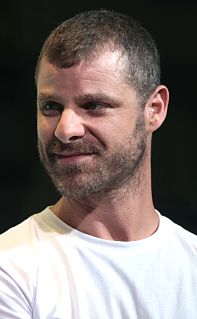A Quote by Daphne Koller
In many of our [online] courses, the median response time for a question on the question and answer forum was 22 minutes - which is not a level of service I have ever offered to my Stanford students.
Related Quotes
To be a scientist you have to be willing to live with uncertainty for a long time. Research scientists begin with a question and they take a decade or two to find an answer. Then the answer they get may not even answer the question they thought it would. You have to have a supple enough mind to be open to the possibility that the answer sometimes precedes the question itself.
A dialogue is very important. It is a form of communication in which question and answer continue till a question is left without an answer. Thus the question is suspended between the two persons involved in this answer and question. It is like a bud with untouched blossoms . . . If the question is left totally untouched by thought, it then has its own answer because the questioner and answerer, as persons, have disappeared. This is a form of dialogue in which investigation reaches a certain point of intensity and depth, which then has a quality that thought can never reach.
We can each sit and wait to die, from the very day of our births. Those of us who do not do so, choose to ask - and to answer - the two questions that define every conscious creature: What do I want? and What will I do to get it? Which are, finally, only one question: What is my will? Caine teaches us that the answer is always found within our own experience; our lives provide the structure of the question, and a properly phrased question contains its own answer.
We're like Magic 8-Balls. After you ask your question and shake the 8-Ball, you read the answer in the little window. If you ever broke open a Magic 8-Ball with a hammer, you discovered that it contained a many-sided plastic object, with an answer on every facet, floating in a cylinder of murky blue fluid. The many-sided core held the answer to your question. My theory is that, as with our children, as with every surface of that geodesic dome inside the 8-Ball, every age we've ever been is who we are.
In the Marquette Lecture volume, I focus on the question in the title. I emphasize the social and political costs of being a Christian in the earliest centuries, and contend that many attempts to answer the question are banal. I don't attempt a full answer myself, but urge that scholars should take the question more seriously.
I'm old, I'm used to crummy service, I'm trained to get crummy service. To me, the fact I can get through to a call centre and then hold for 15 minutes, I don't get that upset. My kids won't. They want to know the answer to their question now. As a company you have to provide an answer to that consumer.
Every time the diaphragm winks, the camera repeats the question that now travels through cyberspace and invades, as a modern virus, the memories of machines, men and women. The question that history sets forth. The question which forces us to define ourselves and whose answer makes us human: On which side are you?





































